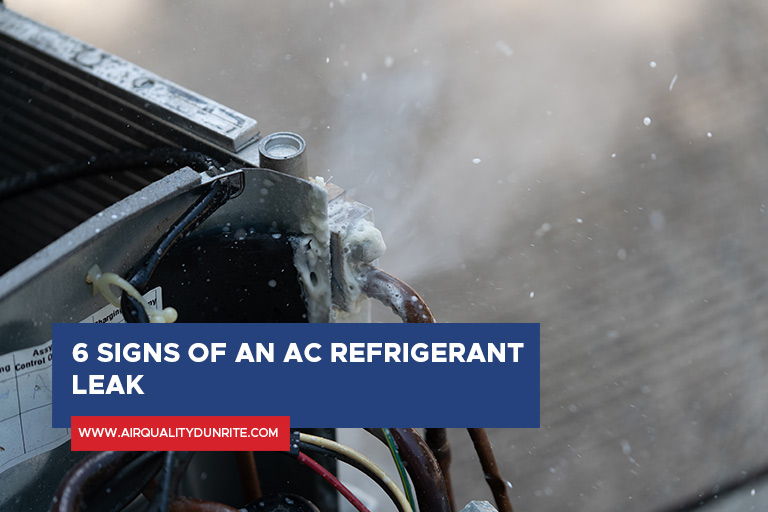Is your home not cooling down as it should? Something might be wrong with your heating, ventilation, and air conditioning (HVAC) unit. One possible reason for this is a refrigerant leak.
There are, however, other problems besides your air conditioner not operating efficiently. Refrigerant inhalation poses serious health risks. Seizures, unconsciousness, and severe lung damage can occur if the substance is inhaled at higher concentration levels. It’s best to make sure that there is no refrigerant leak by calling in the experts.
Signs of Refrigerant Leak
Here’s a compilation of warning signs that will point to an AC refrigerant leak:
1. Failing to deliver cold air

The primary function of refrigerants is to lower room temperature. Your home or place of business will fail to cool if your refrigerant levels have dropped.
Check the air coming from the vents if your central air conditioner isn’t blowing cold air. Confirm the problem by repeating this in different rooms. If the air is not cold then your HVAC system is definitely malfunctioning. In this case, you need to get emergency HVAC repair right away.
2. Ice formation on evaporator coils
The evaporator coils won’t effectively cool warm air if there is not enough refrigerant flowing through them. As a result, the condensation on the coils will freeze. Ice building up on your cooling coils is a sign that you may have a refrigerant leak in your air conditioner.
Although ice on the evaporator coil may be caused by reasons other than a refrigerant leak, ignoring the problem could cause a complete system failure that will require expensive AC repairs. Call an expert immediately.
3. Hissing sound
Hissing noises are frequently brought on by defects or fissures in the coils where the refrigerant flows. When your air conditioner makes hissing noises, one of the most probable causes is a refrigerant leak.
Your air conditioner may also create a louder sound if the refrigerant is seeping through a gaping hole. To be safe call an HVAC system maintenance technician right away to verify the cause of any sound from the air conditioner.
4. Water drips and leaks

Your air conditioner will lose pressure if the level of the refrigerant is low. The coils may freeze as a result, which will cause your AC to drip water constantly and will overflow from the drainage pan.
Do not ignore a dripping AC even if the water is dripping outside your house. Aside from the health risks caused by a refrigerant leak, the drips will make a sound and will create moisture marks on your wall. A damp wall will attract moulds and, besides being unsightly, can be a health hazard.
Just like dripping faucets, the sound of a dripping AC is annoying especially when you are trying to sleep. This calls for the help of technicians offering AC maintenance services.
5. Taking longer to cool the room
To put it plainly, the refrigerant’s role in the cooling process is to take the heat from within your home and send it outside. Your home won’t cool as quickly once the refrigerant level is low.
As a result, your unit will operate longer and exert more effort than usual. Avoid this kind of problem by having your AC regularly maintained. Some companies offer affordable protection plans to keep your AC running efficiently.
6. Spike in electric consumption
Electric consumption will rise as a result of inefficient cooling units. Your air conditioning unit works harder than it should when your cooling system is malfunctioning, which raises your power bill.
Leakage is one of the possible roots of this problem. Review your recent monthly bills and contrast them with previous bills. If your current bill is significantly higher than the preceding months’, you need air conditioner repair services.
The AC will use more electricity if it is not running efficiently. You will also tend to lower the thermostat in an effort to get cooler air, adding more stress to the AC.
What to Do When a Refrigerant Leak is Confirmed
- Repair and refill the leaked refrigerant
To determine if you have an AC refrigerant leak, you need to contact cooling experts near you. They will confirm the issue right away — no need to guess.
A quick fix will be to repair the leak and add more refrigerant. However, keep in mind that it is only a temporary fix and once you have this problem you need to schedule your AC maintenance at shorter intervals to make sure that it will not recur.
- Retrofit the system to use a new type of refrigerant
The Canadian government started withdrawing R22 from the markets as part of its obligation under the Montreal Protocol. R22 manufacturing and import for use in refrigeration and cooling systems were outlawed in Canada beginning January 1, 2020.
Locally sourced, salvaged, and repurposed refrigerants can still be used to maintain and fix old systems. If your system still uses R22 as a cooling medium, you should carefully consider if the cost of a repair is worthwhile, especially for an older (phased-out) system. Retrofitting your system to use a new refrigerant could be an option if your AC is still in excellent condition.
- Buy a new AC unit (recommended)
Ultimately, if the AC unit is showing signs of leakage and had been used for over 10 years, the best course of action is to replace it immediately. Your electric consumption will just go up if you continue to use the unit.
Continuing to use a damaged or old AC unit will result in frequent repairs. Purchasing a brand-new fully functional unit might just be your best option.
An important note is that refrigerants, unlike fuels, don’t need to be refilled regularly. Observable inconsistencies or the raising of room temperature aren’t a problem with well-functioning systems. Never disregard an issue with your AC, especially a refrigerant leak, since this could pose risks to both the environment and the health of your family.
If you suspect a refrigerant leak, get in touch with the cooling experts from Air Quality Dunrite right away. We can confirm a leak and fix it for you. Call us now at (416) 342-1939 for any refrigerant leak or cooling concerns.



